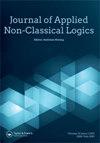Non-commutative propositional logic with short-circuit evaluation
Q1 Arts and Humanities
引用次数: 2
Abstract
Short-circuit evaluation denotes the semantics of propositional connectives in which the second argument is evaluated only if the first is insufficient to determine the value of the expression. Compound statements are evaluated from left to right. Short-circuit evaluation is widely used in programming, with negation and sequential conjunction and disjunction as primitives. We study the question of which laws axiomatise short-circuit evaluation. In MSCL (memorising short-circuit logic), atoms (propositional variables) evaluate to true or false, and in the evaluation of a compound statement, the first evaluation result of each atom is memorised. Hence, MSCL is 'Non-commutative propositional logic with short-circuit evaluation' and atomic evaluations cannot cause a side effect. Next, we consider the case that atoms can also evaluate to the truth value 'undefined'. For two- and three-valued MSCL, we present evaluation trees as an intuitive semantics and provide complete independent equational axiomatisations.具有短路求值的非交换命题逻辑
短路求值表示命题连接词的语义,其中只有当第一个参数不足以确定表达式的值时,才对第二个参数求值。复合语句从左到右求值。短路求值在规划中有着广泛的应用,它以否定和顺序合取与析取为原语。我们研究了哪些定律公理化短路评定的问题。在MSCL(记忆短路逻辑)中,原子(命题变量)的求值为真或假,在复合语句的求值中,每个原子的第一个求值结果被记忆。因此,MSCL是“短路求值的非交换命题逻辑”,原子求值不会产生副作用。接下来,我们考虑原子也可以求值为真值'undefined'的情况。对于二值和三值MSCL,我们将评估树作为一种直观的语义,并提供了完全独立的等式公理化。
本文章由计算机程序翻译,如有差异,请以英文原文为准。
求助全文
约1分钟内获得全文
求助全文
来源期刊

Journal of Applied Non-Classical Logics
Arts and Humanities-Philosophy
CiteScore
1.30
自引率
0.00%
发文量
8
 求助内容:
求助内容: 应助结果提醒方式:
应助结果提醒方式:


